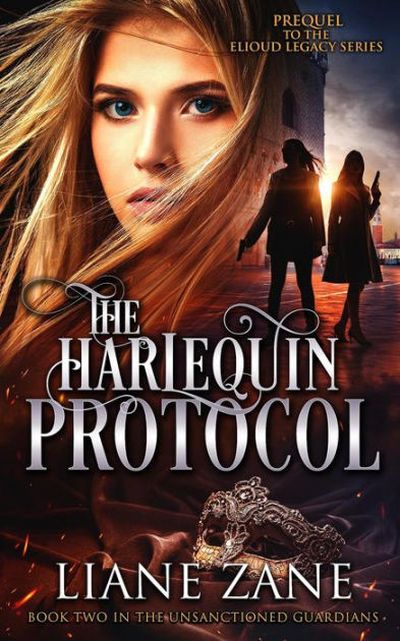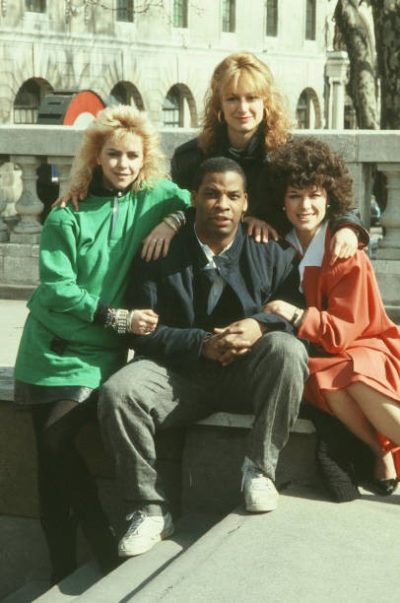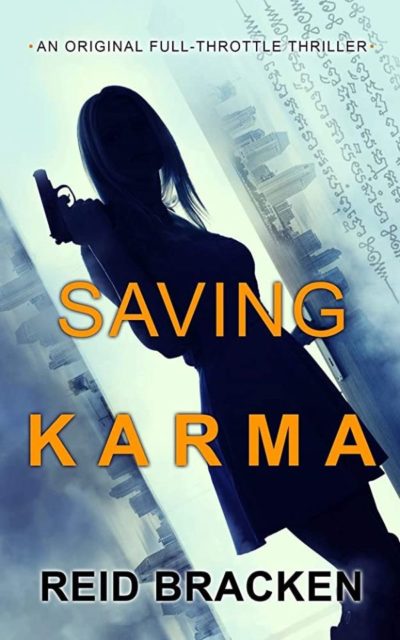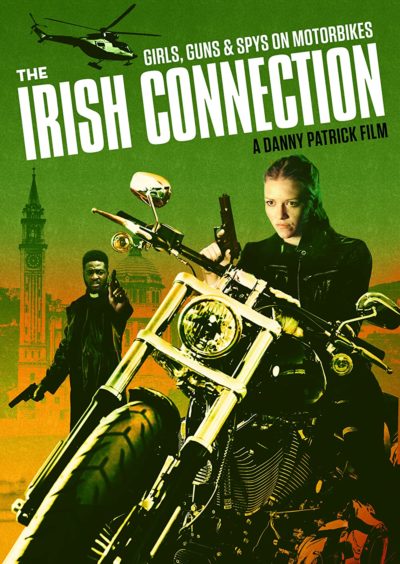Literary rating: ★★★★★
Kick-butt quotient: ☆☆☆☆
 This is the second novel in the author’s Unsanctioned Guardians trilogy, a prequel to her earlier Elioud Legacy series. The new trilogy presents the background of how the three heroines of the first one (all of whom were intelligence agents, though of different nationalities) met and formed their sub rosa partnership as off-the-books rescuers of female victims of sexual abuse and trafficking. In the first book, The Covert Guardian, Zane focused entirely on Olivia Markham, who would become the trio’s ringleader, describing her recruitment and first mission with the CIA. Olivia continues to be the main (and almost sole) viewpoint character here, but this installment also introduces the other members of the threesome, Capt. Alzbeta “Beta” Czerna of Czech military intelligence and Anastasia “Stasia” Fiore of Italy’s CIA equivalent, AISE.
This is the second novel in the author’s Unsanctioned Guardians trilogy, a prequel to her earlier Elioud Legacy series. The new trilogy presents the background of how the three heroines of the first one (all of whom were intelligence agents, though of different nationalities) met and formed their sub rosa partnership as off-the-books rescuers of female victims of sexual abuse and trafficking. In the first book, The Covert Guardian, Zane focused entirely on Olivia Markham, who would become the trio’s ringleader, describing her recruitment and first mission with the CIA. Olivia continues to be the main (and almost sole) viewpoint character here, but this installment also introduces the other members of the threesome, Capt. Alzbeta “Beta” Czerna of Czech military intelligence and Anastasia “Stasia” Fiore of Italy’s CIA equivalent, AISE.
My impression is that about two years have passed in Olivia’s career since the previous book (the date for this one, 2011, isn’t mentioned in the text itself as I recall, though it is in the cover copy; but I don’t remember any exact date for the first one.) Here as in all of Zane’s work, her knowledge of spy-craft, of the various brands, specs and capabilities of firearms and explosives used by U.S. and European military and intelligence services, and of the cultural and physical geography of a variety of European settings is a strength of the series, and never delivered intrusively. (Action here moves from Berlin to Brussels, to Prague and the Czech-Polish border region, and to Venice.)
We also get an inside look at the bureaucratic mindset of the present-day CIA (which has been negatively commented on in nonfiction writings by intelligence professionals who know about the subject), the penchant of some of its honchos for turf and ego protection, and the tendencies towards abuse of power that can be endemic in secret organizations. (The latter is a point of contact with John LeCarre’s work, though I suggested in my review of the previous book that Zane’s vision is more like that of Manning Coles or Alistair MacLean –like the latter, she does view espionage in moral terms, as properly concerned with thwarting genuine evil, but she’s also realistic about the moral shortcomings and conflicting agendas that intelligence agencies staffed by fallible humans can be prey to.)
 Because the author and I are Goodreads friends, she graciously gifted me with a review copy of the paperback edition of this book, as she has with all of her books, as soon as it was published; though she knew I’d really liked the previous book, she didn’t pressure me for a favorable review, but trusted that the book would stand on its merits. It definitely did; I actually liked this one even better! What earned the added appreciation (and the fifth star) was what I felt was the heightened dimension of moral challenge and choice here, which for me often makes the difference between great and merely good fiction, and which isn’t as strongly present in the first book. Discerning what the right thing is here requires thinking for oneself, not just obeying orders; and deciding to do it comes with a real risk, not just of harm to life and limb, but of disapproval from the powerful, of serious repercussions to one’s career, and maybe of legal punishment. The strong, distinct characterizations of the three heroines, who are each very different individuals though sharing a basic gut instinct for justice and decency, is also a positive feature that makes the book stand out from the pack.
Because the author and I are Goodreads friends, she graciously gifted me with a review copy of the paperback edition of this book, as she has with all of her books, as soon as it was published; though she knew I’d really liked the previous book, she didn’t pressure me for a favorable review, but trusted that the book would stand on its merits. It definitely did; I actually liked this one even better! What earned the added appreciation (and the fifth star) was what I felt was the heightened dimension of moral challenge and choice here, which for me often makes the difference between great and merely good fiction, and which isn’t as strongly present in the first book. Discerning what the right thing is here requires thinking for oneself, not just obeying orders; and deciding to do it comes with a real risk, not just of harm to life and limb, but of disapproval from the powerful, of serious repercussions to one’s career, and maybe of legal punishment. The strong, distinct characterizations of the three heroines, who are each very different individuals though sharing a basic gut instinct for justice and decency, is also a positive feature that makes the book stand out from the pack.
Bad language here is minor. There’s no explicit sex; Olivia stumbles on a gang rape at one point, but it’s not graphically described, and though we see the traumatized and abused victims of sex trafficking (and in one case the dead body of a victim), we aren’t forced to see what they went through. As far as Olivia’s personal life is concerned, it’s briefly mentioned that since the first book, she’s been intimate with only one man, whom she loved and expected to marry (readers of the preceding trilogy will know that didn’t happen!), but the couple’s privacy isn’t violated.
We do have a lot of violence here, and a high body count, but Zane doesn’t make it any more gory than it has to be. IMO, this trilogy should be read in order. However, I wouldn’t say that the previous trilogy necessarily needs to be read first; and it’s really in a different genre(s) than this one, so might not actually appeal to all of the same readers (though I greatly like both). This is neither obviously supernatural fiction (though readers who’ve read the Elioud Legacy will pick up on something that others won’t) nor romance. But it should appeal to all fans of action adventure and espionage fiction, especially those who appreciate heroines in action roles (here, we’ve got not just one but three ladies who can and do kick some serious evil-doer butt!).
Author: Liane Zane
Publisher: Zephon; available through Amazon, both for Kindle and as a print book.
A version of this review previously appeared on Goodreads.






 On Amazon, this is subtitled, “A full-throttle Thailand thriller,” but that’s a little bit of a misleading label. The bulk of the story – at least, the bits that matter – actually take place in China. The book itself goes with “A full-throttle thriller throughout Asia,” Except it starts off in the not-exactly Asian setting of San Bernardino, California, where Bree Thomas is just about to graduate. This is despite the problems of her adopted family, who she was sent to live with after her parents were killed in Thailand. She gets a chance to escape it all, in the form of an apprentice program with the Meng Foundation, a charitable group who help refugees around the world.
On Amazon, this is subtitled, “A full-throttle Thailand thriller,” but that’s a little bit of a misleading label. The bulk of the story – at least, the bits that matter – actually take place in China. The book itself goes with “A full-throttle thriller throughout Asia,” Except it starts off in the not-exactly Asian setting of San Bernardino, California, where Bree Thomas is just about to graduate. This is despite the problems of her adopted family, who she was sent to live with after her parents were killed in Thailand. She gets a chance to escape it all, in the form of an apprentice program with the Meng Foundation, a charitable group who help refugees around the world. I think I can point almost to the exact point where this one jumped the shark. It had started well enough. Jamie Austen works for the CIA, taking down human traffickers across the world, in conjunction with a non-governmental organization called Save the Girls. Now, I have questions here: why exactly would the CIA
I think I can point almost to the exact point where this one jumped the shark. It had started well enough. Jamie Austen works for the CIA, taking down human traffickers across the world, in conjunction with a non-governmental organization called Save the Girls. Now, I have questions here: why exactly would the CIA  At times this feels more like a fancy dress party than a film. People dressed up as nuns. People dressed up as clowns. People dressed as priests. This probably isn’t surprising, considering that it feels like Patrick is cosplaying as a film-maker. There’s little or no evidence to indicate he knows how to construct a coherent or interesting narrative. Instead, he proceeds by simply dropping in scenes which, I gueaa, are supposed to be “amusing”, without rhyme or reason. I called Aureille the heroine above, though there’s precious little to make her so. I presumed she is supposed to be the “good guy”, because there are no other credible candidates for that role, so she earns it by default.
At times this feels more like a fancy dress party than a film. People dressed up as nuns. People dressed up as clowns. People dressed as priests. This probably isn’t surprising, considering that it feels like Patrick is cosplaying as a film-maker. There’s little or no evidence to indicate he knows how to construct a coherent or interesting narrative. Instead, he proceeds by simply dropping in scenes which, I gueaa, are supposed to be “amusing”, without rhyme or reason. I called Aureille the heroine above, though there’s precious little to make her so. I presumed she is supposed to be the “good guy”, because there are no other credible candidates for that role, so she earns it by default. If 2023 has been underwhelming on the theatrical front (to put it mildly), the various streaming services have certainly had no shortage of entries to keep us occupied here. This one comes to us from Paramount+, and stars Saldaña – already known around these parts, most likely for
If 2023 has been underwhelming on the theatrical front (to put it mildly), the various streaming services have certainly had no shortage of entries to keep us occupied here. This one comes to us from Paramount+, and stars Saldaña – already known around these parts, most likely for  We begin en media res, on her first mission as a fledgling operative in a town on the Egyptian Sinai penninsula, where she’s supposed to provide scouting and lookout functions for a team tasked with taking out a terrorist. (But circumstances will cause her role to morph into something more demanding….) Well positioned flashbacks show us how, as a smart, physically fit and observant Tel Aviv Univ. student with a double major in economics and foreign languages, a solid background of martial arts training, and no close family (her mother had recently died, and her brother had emigrated to the U.S.) she was recruited into Mossad. (Later flashbacks show her family’s harrowing trek to Israel from danger in an unraveling Ethiopia, on which her father was killed, when she was a very small child, and a later formative experience of standing up to two bullies in order to defend another child, which shaped her penchant for defending innocents.)
We begin en media res, on her first mission as a fledgling operative in a town on the Egyptian Sinai penninsula, where she’s supposed to provide scouting and lookout functions for a team tasked with taking out a terrorist. (But circumstances will cause her role to morph into something more demanding….) Well positioned flashbacks show us how, as a smart, physically fit and observant Tel Aviv Univ. student with a double major in economics and foreign languages, a solid background of martial arts training, and no close family (her mother had recently died, and her brother had emigrated to the U.S.) she was recruited into Mossad. (Later flashbacks show her family’s harrowing trek to Israel from danger in an unraveling Ethiopia, on which her father was killed, when she was a very small child, and a later formative experience of standing up to two bullies in order to defend another child, which shaped her penchant for defending innocents.) ★★
★★ This one certainly won’t, barely reaching the level of acceptable entertainment, and sadly, continuing Gal Gadot’s streak of swings and misses. She blazed onto the scene in
This one certainly won’t, barely reaching the level of acceptable entertainment, and sadly, continuing Gal Gadot’s streak of swings and misses. She blazed onto the scene in  Dear god, I almost lost consciousness merely typing the previous paragraph. Reviewing the previous work of writers Greg Rucka and Allison Schroeder, what stands out is an almost complete lack of action movies. Rucka has worked mostly in comics (including the one which became
Dear god, I almost lost consciousness merely typing the previous paragraph. Reviewing the previous work of writers Greg Rucka and Allison Schroeder, what stands out is an almost complete lack of action movies. Rucka has worked mostly in comics (including the one which became  The above is said by an Arab character, passing on advice from her father. By the end of it, despite this being an Israeli-produced movie, you may be inclined to agree with them. Mind you, on the basis of this, you should also never trust, the Arabs, Americans or Germans either. This dive into the world of intelligence, counter-intelligence and realpolitik is so morally murky, it should come with a head-lamp, to assist viewers peering into the darkness. Naomi (Riskin) is a Mossad agent, who has been out of the game for two years, since her husband, a fellow spy, was killed in a terrorist attack. She has now been tasked with what should be a simple job, guarding Hezbollah informant Mona (Farahani).
The above is said by an Arab character, passing on advice from her father. By the end of it, despite this being an Israeli-produced movie, you may be inclined to agree with them. Mind you, on the basis of this, you should also never trust, the Arabs, Americans or Germans either. This dive into the world of intelligence, counter-intelligence and realpolitik is so morally murky, it should come with a head-lamp, to assist viewers peering into the darkness. Naomi (Riskin) is a Mossad agent, who has been out of the game for two years, since her husband, a fellow spy, was killed in a terrorist attack. She has now been tasked with what should be a simple job, guarding Hezbollah informant Mona (Farahani). Twenty minutes into this, I was certain I had made a terrible mistake. These four young women were among the most grating and unpleasant characters I’d seen in a movie. I’m talking actively awful: crass, shallow and entitled. They head off to Thailand for a girls’ getaway on a private jet owned by the father of Diamond (Luss), a film producer. By the time they land, check out their mansion and enjoy the local sights, I was ready to set up the guillotines. Then there’s a luggage mix-up, leaving them with a large quantity of Thai cartel coke, and one of their number is kidnapped, in order to coerce them into returning the goods.
Twenty minutes into this, I was certain I had made a terrible mistake. These four young women were among the most grating and unpleasant characters I’d seen in a movie. I’m talking actively awful: crass, shallow and entitled. They head off to Thailand for a girls’ getaway on a private jet owned by the father of Diamond (Luss), a film producer. By the time they land, check out their mansion and enjoy the local sights, I was ready to set up the guillotines. Then there’s a luggage mix-up, leaving them with a large quantity of Thai cartel coke, and one of their number is kidnapped, in order to coerce them into returning the goods.